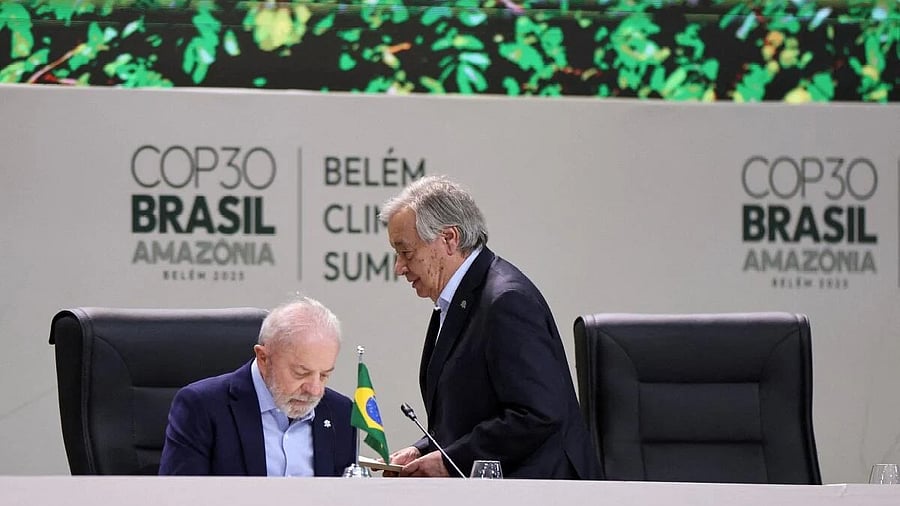
United Nations Secretary-General Antonio Guterres walks next to Brazil's President Luiz Inacio Lula da Silva as they attend the opening of the Belem Climate Summit plenary session, as part of the United Nations Climate Change Conference (COP30), in Belem, Brazil, November 6, 2025.
Credit: Reuters Photo
The 30th Conference of the Parties (COP30) of the UN Framework Convention on Climate Change (UNFCC), which starts in Belém, Brazil, on Monday, has been described as the “implementation COP”.
It is expected to focus on how to put existing climate agreements into practice and realise commitments already made. New promises may be forthcoming but the priority will be to find ways and means to reach goals already set. In a decade after the Paris Climate Agreement came into force, the world has not moved much in implementation, but climate change problems have worsened.
Even if all the present plans fructify, the world will not achieve the 1.5 degrees Celsius threshold set in Paris. There has been no reduction in global greenhouse gas emissions in the past decade.
At the heart of the fight against climate change are policies of mitigation and their implementation. Developing countries need technological and financial assistance from the developed world to achieve this objective. At COP29, the richer countries had offered the poorer countries at least 300 billion dollars a year to help them tackle climate change.
This is much less than what the developing world needs and the promise has in any case not been fulfilled. A recent ‘Baku to Belém Roadmap’ prepared on the basis of wide consultations had projected climate finance of the order of 300 billion dollars a year, to reach 1.3 trillion dollars by 2035.
The expenditure on governance and development and high state of debt make it difficult for poor countries to spend on climate action. If COP29 at Baku in Azerbaijan mentioned the broad commitments of the rich world, a road map will now have to be prepared for their delivery, especially because many developed countries are reviewing their multilateral commitments.
While about 200 countries will attend COP30, the US will be a notable absence. The withdrawal of the US from climate negotiations will be a serious handicap as it is the second largest emitter of greenhouse gases and had a key role in climate finance initiatives.
China, the European Union (EU), and the host country Brazil are expected to be active at the meet to take the negotiations forward. India is the third largest emitter but has low per capita emissions and a vulnerable population. It will have a major role in the negotiations. COP30 is expected to work on an action agenda of 30 key goals which will be on the table.
At the Leaders’ Summit before the meet, UN Secretary-General Antonio Guterres said: “It’s no longer time for negotiations. It’s time for implementation, implementation and implementation.” That may also be taken as a warning.
